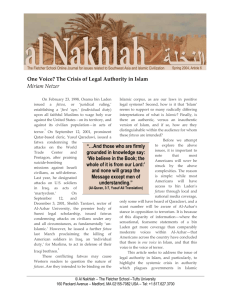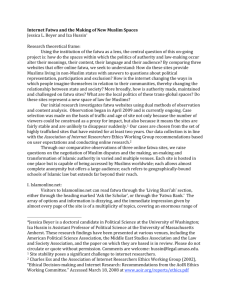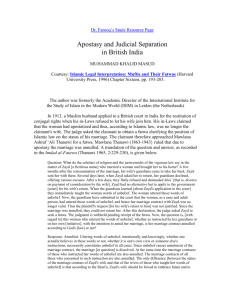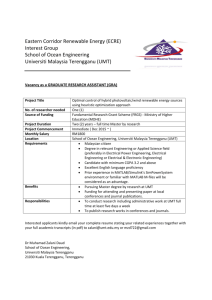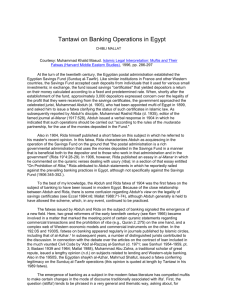Challenges in Fatwa Management in Terengganu, Malaysia Wan Zulkifli Wan Hassan
advertisement
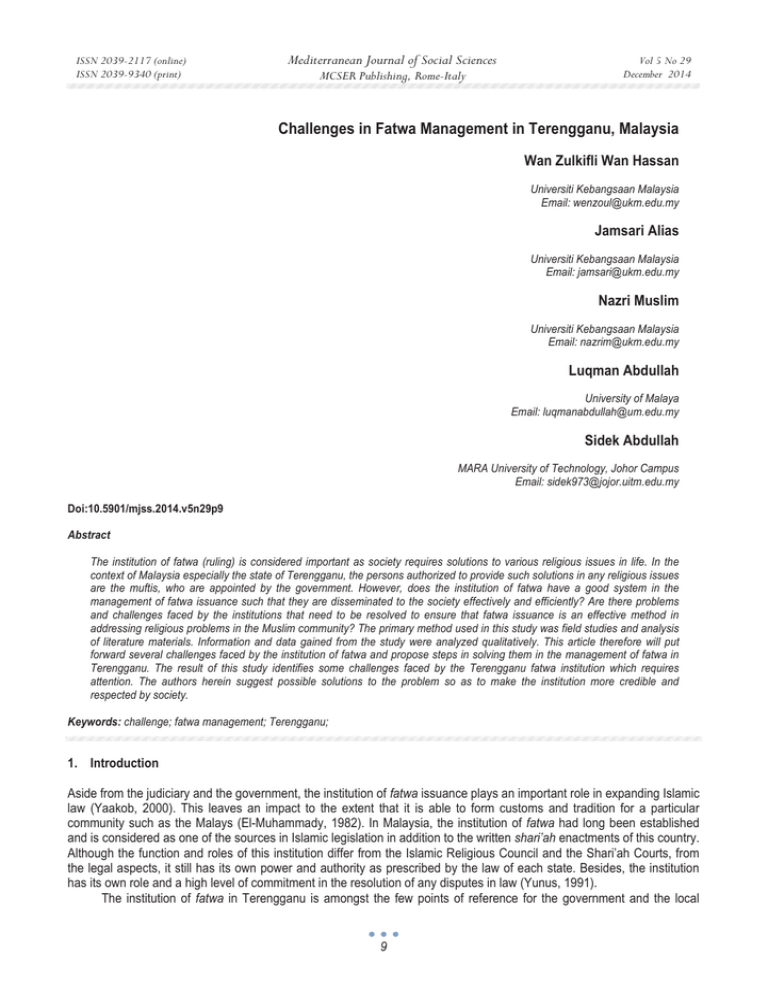
ISSN 2039-2117 (online) ISSN 2039-9340 (print) Mediterranean Journal of Social Sciences MCSER Publishing, Rome-Italy Vol 5 No 29 December 2014 Challenges in Fatwa Management in Terengganu, Malaysia Wan Zulkifli Wan Hassan Universiti Kebangsaan Malaysia Email: wenzoul@ukm.edu.my Jamsari Alias Universiti Kebangsaan Malaysia Email: jamsari@ukm.edu.my Nazri Muslim Universiti Kebangsaan Malaysia Email: nazrim@ukm.edu.my Luqman Abdullah University of Malaya Email: luqmanabdullah@um.edu.my Sidek Abdullah MARA University of Technology, Johor Campus Email: sidek973@jojor.uitm.edu.my Doi:10.5901/mjss.2014.v5n29p9 Abstract The institution of fatwa (ruling) is considered important as society requires solutions to various religious issues in life. In the context of Malaysia especially the state of Terengganu, the persons authorized to provide such solutions in any religious issues are the muftis, who are appointed by the government. However, does the institution of fatwa have a good system in the management of fatwa issuance such that they are disseminated to the society effectively and efficiently? Are there problems and challenges faced by the institutions that need to be resolved to ensure that fatwa issuance is an effective method in addressing religious problems in the Muslim community? The primary method used in this study was field studies and analysis of literature materials. Information and data gained from the study were analyzed qualitatively. This article therefore will put forward several challenges faced by the institution of fatwa and propose steps in solving them in the management of fatwa in Terengganu. The result of this study identifies some challenges faced by the Terengganu fatwa institution which requires attention. The authors herein suggest possible solutions to the problem so as to make the institution more credible and respected by society. Keywords: challenge; fatwa management; Terengganu; 1. Introduction Aside from the judiciary and the government, the institution of fatwa issuance plays an important role in expanding Islamic law (Yaakob, 2000). This leaves an impact to the extent that it is able to form customs and tradition for a particular community such as the Malays (El-Muhammady, 1982). In Malaysia, the institution of fatwa had long been established and is considered as one of the sources in Islamic legislation in addition to the written shari’ah enactments of this country. Although the function and roles of this institution differ from the Islamic Religious Council and the Shari’ah Courts, from the legal aspects, it still has its own power and authority as prescribed by the law of each state. Besides, the institution has its own role and a high level of commitment in the resolution of any disputes in law (Yunus, 1991). The institution of fatwa in Terengganu is amongst the few points of reference for the government and the local 9 ISSN 2039-2117 (online) ISSN 2039-9340 (print) Mediterranean Journal of Social Sciences MCSER Publishing, Rome-Italy Vol 5 No 29 December 2014 Muslim community to obtain rulings and their clarifications in religious matters and their daily activities. The institutions which can issue fatwas in Terengganu are the State Mufti and the Terengganu State Fatwa Committee and they have issued many fatwas and clarifications on rulings in various areas (Hassan, 2009). Samsuddin (2009) had made several suggestions to the institution of fatwa to ensure that each fatwa issued is in compliance with the shari‘ah and able to preserve its credibility. Hence, each gazetted fatwas must be implemented professionally and a fatwa education program must be comprehensively disseminated at each level of society, in order to avoid any dispute on the fatwa issued. In addition, Samsuddin (2009) emphasized that muftis cannot escape the possibility of mistakes being made in the issuance of fatwas as there are factors which may cause them such as misinterpretation of the texts of al-Quran and the sunnah, misunderstanding of the text and hastiness in issuance of the fatwa, and so on. Terengganu was chosen as the location of this study because, as stated by Hooker (1993), Terengganu was one of the states with the highest number of fatwa issuance recorded, next to Johor. He further clarified that among the factors which led to the high number of fatwa being issued in Terengganu and Johor was the serious attention given by the religious administrators of these two states to the institution of fatwa. This begs the question whether or not the institution of fatwa in Terengganu plays an active and efficient role in handling current developments? Do these institutions have a good management system to ensure that the fatwas are disseminated to society in an effective and efficient manner? Are there any problems or challenges that need to be resolved to ensure the effectiveness of the fatwa institution in resolving religious issues in the Muslim community? The main method used in this research was a field study and an analysis of previous literature on the matter. Data collected were analyzed and qualitatively coded using the content analysis technique. The analysis was also conducted by determining the theory/hypothesis from the data compiled (grounded theory), extracting hidden information within the text (discourse analysis), scrutinizing indicators such as words, body language and others (semiotic) and understanding over an individual’s perspective, views and experience. 2. Challenges There are several challenges faced by the institution of fatwa in Terengganu which need to be given attention and resolved by all parties in order to ensure that it becomes an important institution in a Muslim society and reference point in carrying out daily activities. Among the identified issues are: 2.1 Incomplete Documentation of the Fatwa Many fatwas issued in Terengganu have neither been compiled nor have they been properly and comprehensively documented, since the establishment of the fatwa institution in Terengganu. In fact the authors found that fatwas issued before the time Sheikh Sayyid Yusuf ’Ali al-Zawawi held the mufti office have not been recorded and documented in a comprehensive and orderly manner (Hassan, 2009). There exist a significant number of fatwas which are still in the form of minutes of meetings, even though from the author’s viewpoint they should be compiled into a book and distributed to society in the form of printed or electronic media. In fact, some of this type of fatwas overlapped with and had been mixed with the question and answer type of fatwas in a particular book or document. This can lead to non-standardization in the classification of the types of fatwa. A large number of fatwas issued in the form of questions and answers were not properly dated as to when they were issued. What the authors did obtain was a period of dates based on the length of time a Mufti held his position without determining the exact date when the fatwa was issued, except for fatwas which have been gazetted and minuted. Examples of fatwa which only mentioned the year of the fatwas are the ‘Fatwas of the State Mufti of Terengganu’ from 1372-1389 A.H. equivalent to 1953-1970 A.D. by al-Zawawi (Undated), published by Jabatan Hal Ehwal Agama Terengganu, ‘Himpunan Jawapan Kemusykilan-Kemusykilan Agama’ [Collection of Answers to Religious Queries] by Jabatan Mufti Negeri Terengganu (1998), ‘Fatwa Mufti’ by Jabatan Hal Ehwal Agama Terengganu (2000), Collection of Answers to Religious Queries by Ambak (2001) published by Majlis Agama Islam dan Adat Melayu Terengganu. Whereas the collection of fatwa that were clearly dated are the Fatwa Decisions of State of Terengganu issued in the Minutes of Meetings of the Committee of Muslim Scholars/Fatwa of the State of Terengganu from the years 1956 to 2006, and also gazetted fatwas. This made it harder sometimes for the researcher to understand the background of the questioner and the social aspects and circumstances when the fatwas were issued. Understanding these aspects is crucial to further ensure that the fatwas issued at that time truly meet the current needs then. From the authors’ observation, the number of fatwas issued and recorded in the period a particular mufti held office was illogical. For example, during the times of Mufti Dato’ 10 ISSN 2039-2117 (online) ISSN 2039-9340 (print) Mediterranean Journal of Social Sciences Vol 5 No 29 December 2014 MCSER Publishing, Rome-Italy Indera Guru Wan Abdul Manan, there were 131 fatwas issued while he was in office for 13 years. Out of the fatwas issued, fatwas related to shari‘ah were the most in number followed by Usuluddin (theology) and social-related fatwas. Table 1 below shows the statistic of fatwas issued by the Mufti according to fields and types of fatwas. Table 1. Statistic of Fatwa Issuance by Islamic Studies Discipline (1976-1988) Field of Islamic Studies Shariah (Law) Usuluddin (Theology) Social Affairs Total Gazette - Minutes of Meeting 31 13 9 53 Q&A 68 3 7 78 Total 99 16 16 131 Table 1 shows that most fatwas issued was shari’ah related which amounts to 99 fatwas or 75.58 per cent of the total of fatwas issued by the Mufti/Committee of Fatwa. This is followed by theological and the social related fatwas, i.e. each with 16 fatwas or 12.21 per cent. Based on Table 1 above, question-and-answer type fatwas were issued more frequently. 78 issued fatwas or 59.54 per cent compared to minute-based fatwas, which are 53 fatwas or 40.46 per cent, while not a single fatwa was issued in the form of gazette. If one looks from the perspective of the form of fatwas issued, the field of shari’ah produced many fatwas in the form of questions and answers, amounting to 68 fatwas or 87.17 per cent as compared to the field of Social Affairs, which is, 7 fatwas issued or 8.99 per cent. Meanwhile the field of Usuluddin had the fewest number of fatwas issued in the form of questions and answers, being 3 or 3.84 per cent. Based on the table above, shari’ah-related fatwas in the form of minutes of meeting were the most produced compared to the less numbers produced in the field of Usuluddin and Social Affairs. As many as 31 fatwas or 58.49 per cent were minuted under the field of shari’ah compared to the field of Usuluddin where only 13 fatwas or 24.52 per cent were produced and in the field of Social Affairs, where 9 fatwas or 16.99 per cent were produced. Additionally, for syariah-related fatwas, question-and-answer type fatwas were the most produced, with 68 fatwas or 68.68 per cent of the total amount, compared to the fatwas produced in the form of minutes of meetings, being only 31 fatwas or 31.32 per cent. This situation is different from the field of Usuluddin and Social Affairs. The issuance of fatwas in the field of Usuluddin in the form of minutes of meeting were most frequent with 13 fatwas issued or 81.85 per cent compared to the fatwas issued in the form of questions and answers, being only 3 fatwas or 18.15 per cent. Social Affairs – related fatwas produced in the form of minutes of meetings formed the largest portion; that is 9 fatwas or 56.25 per cent compared to the question-and-answer type, which is 7 fatwas or 43.75 per cent. Based on the above statistics, it is clear that shari’ah-related issues was frequently focused on by the society at the time, as it relates much to rules in the Muslim community in Terengganu. Having said that however the field of Usuluddin and the Social Affairs were also considered as important as they also faced issues related to Usuluddin and daily affairs. A similar illogicality can be said with respect to the number of fatwas issued during the term of Dato’ Dr. Hj. Muhammad Zubair Awang. He had held the state mufti office for only one year. However, in the authors’ opinion, the 6 fatwas produced under his term does not reasonably correspond with the term held. In fact, not even one fatwa with respect to zakah was produced, whether in the form of gazette, minutes of meetings, or questions and answers. From the fatwas that could be compiled during the term of Dato’ Dr Hj. Muhammad Zubair Awang only fatwas in Usuluddin and shari’ah matters were produced. Not a single fatwa was produced in the field of the Social Affairs. Based on the analysis, shari’ah related fatwas were the most produced, with 5 fatwas or. 83.33 per cent and Usuluddin related only produced a single fatwa or 16.67 per cent. These statistics can be seen in Table 2 as follows: Table 2. Statistics of Fatwa by the Islamic Studies Disciplines Field of Islamic Studies Shariah Usuluddin (Theology) Social Affairs Total Gazette 1 1 2 Minutes of Meeting 4 4 Q&A - Total 5 1 6 Based on Table 2 above, it can be seen that only fatwas in the form of gazette and minutes of meetings were decided by the Mufti and the Committee of Fatwa. Not a single fatwa had been produced in the form of questions and answers. It is clear that in shari’ah related matters, fatwas in the form of minutes of meetings, formed the largest number with 4 fatwas 11 ISSN 2039-2117 (online) ISSN 2039-9340 (print) Mediterranean Journal of Social Sciences MCSER Publishing, Rome-Italy Vol 5 No 29 December 2014 or 80 per cent compared to gazetted fatwa, which only had 1 fatwa produced, or 20 per cent. Whereas in the field of Usuluddin, only gazetted fatwas were produced, and there were none in either minutes of meeting or the questions and answers form. Hence the small number of fatwas issued should not occur as it is one of the institutions which can clarify the rule of Islamic Law to the Muslim community. The lack of fatwa and explanations of the rulings from the mufti and the Committee of Fatwa can lead to problems facing the society, in carrying out their daily activities, in particular when determination of rulings are involved. 2.2 Inappropriate Procedures of Fatwa Issuance Based on the observations made, the process of issuing fatwas in Terengganu by the Mufti or the Committee of Fatwa in Terengganu remains closely bound to 1955, 1986 and 2001 of The State Enactment of Administration of Islam (Terengganu). The enactment stated that all the fatwas that have been issued must be based on the views of Shafi’i mazhab (Terengganu, The Administrative Laws of Islamic Law 1955 (1357) (Law No. 4 of the year 1955), Clause 21 (1); The State Enactment of Administration of Islam (Terengganu) (No. 12/1986) Section 26(1)). In the issuance of fatwa procedure, the principal determining views are those of the Shafi‘i mazhab. In fact, certain opinions also considered the qawl da’if of the mazhab. However, if a dispute cannot be solved under the Shafi’ite school of jurisprudence, the Mufti and the Committee of Fatwa may then adopt any other views from fuqaha’ of other schools of jurisprudence if it can solve the problems in the society. They can also determine the ruling based on ijtihad (individual/personal interpretation) if the particular issues have not been previously discussed by the fuqaha’ (Section 54 (3), The State Enactment of Administration of Islam (Terengganu) 2001). However, if we look at the provisions under the Enactment, it appears that a more flexible procedure is provided to the Committee of Fatwa and the mufti to accept any opinion from any mazhab recognized by the Ahl al-Sunah waJama'ah. In actual fact, the Committee of Fatwa and the Mufti are allowed to accept any opinions outside of these 4 mazhabs and to determine the rules by way of ijtihad if the particular query had not been previously discussed by earlier Muslim scholars. This shows that the Committee of Fatwa and the Mufti had the freedom to decide the appropriate method and procedures to resolve any issues occuring in the society, based on the public need and interest. Hence to be strictly dependent on the Shafi‘ite mazhab seems to be rather unreasonable in the practice of issuance of fatwa, even though it may affect public interest. In the opinion of the authors, if the committee of fatwa and mufti wishes to give priority to the Shafi’ite mazhab when determining any fatwa, then the priority is suitable for the native residents and the general residence of Terengganu. However, it will not be appropriate to apply the same in the Muslim community especially amongst those are followers of the non-Shafi‘i mazhab especially foreigners who are in Terengganu to work or study. This can cause difficulty for them to seek clarification on Islamic rulings from the Mufti and the Committee of Fatwa if priority is given to the Shafi‘ite school of thought in determining the fatwa. In addition thereto, in determining a fatwa, especially those which require gazetteing or need to be discussed in a meeting, a considerable length of time is usually involved before any resolution can take place. This is because the provisions of the Enactment had inserted additional and specific procedures in fatwa issuance by the Committee of Fatwa as a result of several matters. This will affect the credibility of the institution of fatwa and cause difficulty for the public, in carrying out their daily affairs, to obtain clarification of the rulings, particularly in matters involving halal (permissible/lawful) or haram (forbidden/unlawful). Thus, the majority of the community opt for the easier and faster method by asking their questions through the telephone, email or by way of direct visit to the Department of Mufti to get explanation from the Mufti or the officer from the Department of Mufti (Taufek, 2004). This however may has a less than satisfactory implication on the strength of the fatwa and clarifications of the ruling as there is the possibility that the Mufti and the officers involved are not well prepared to resolve the issues. 2.3 Majority of the Fatwas are Not Enforced According to the statistics and research done by the authors, most of the fatwas issued by the Mufti and the Committee of Fatwa were enforced on the Muslim community by the government of Terengganu, as only 6 fatwas had been gazetted in Terengganu from the year 1994 to 2005. Majority of the fatwas that were issued were in the form of question and answer and minutes of meetings. Furthermore the gazetted fatwa involved aqidah (faith) and only a small part involved the aspect of shari‘ah. Hence the majority of the fatwa issued by the Mufti and the Committee of Fatwa appears to be mere guideline and the Muslim community is free to adopt them or do otherwise as there are no repercussions for failure to abide by the fatwas. This can be explained through Table 3 below. 12 ISSN 2039-2117 (online) ISSN 2039-9340 (print) Mediterranean Journal of Social Sciences Vol 5 No 29 December 2014 MCSER Publishing, Rome-Italy Table 3. Statistics of Fatwa in Terengganu (1953-2005) Field of Islamic Studies Shariah Usuluddin (Theology) Social Affairs Total Gazette 2 4 6 Minutes of Meeting 239 27 91 357 Q&A 833 137 180 1150 Total 1074 168 271 1513 Based on Table 3 above, it is clear that the fatwas that have been produced in the form of question and answer formed the highest amount, with 1150 or 76 per cent compared to those produced in the form of minutes of meeting with 357 fatwas or 23.59 per cent and fatwas in the form of gazette with 6 or 0.41 per cent. Looking at the forms of fatwa which has been issued in the form of gazette, the field of Usuluddin had the highest number of fatwas compared to the fatwas in the field of Shari’ah. In the field of Social Affairs, none was issued in gazette form. As many as 4 fatwas or 67 per cent were gazetted in Usuluddin compared to those in the field of shari’ah which were 2 fatwas or only 33 per cent. From the above statistics, it is evident that shari’ah is an area in which the public often raise their query to the fatwa institution in Terengganu. It is necessary for the Committee of Fatwa to take this matter seriously so that the society will not disregard the practice of the fatwa, by looking at the suitability of fatwas in shari’ah for gazettement. Similarly, in the context of developing government policies of strengthening the faith of the Muslims, the Committee of Fatwa should take a serious note in Usuluddin-related fatwas so that they can be enacted according to the government policy needs. The lack of enforcement of fatwas will lead to the society’s non-compliance with the majority of the fatwas issued on the grounds that they have not been gazetted by the government. Whereas a gazette of a fatwa reflects the authority it carries. Those fatwas with such authority can bind Muslims legally to comply with it and not breach it. Hence, fatwas which do not have authority cannot be enforced and it is therefore not wrong for Muslim residents of Terengganu to not follow them. This is a disadvantage to the Government and adversely affects the efficiency of each fatwa which has been issued by the Mufti and the State Committee of Fatwa. As an example, the fatwa about “only Government appointed ‘amil (zakat collectors) are allowed to collect the zakat” was not gazetted, and this can lead to losses to the government and affects Baitulmal revenue from zakat that can be distributed to needy asnaf. As the authors sees it, this situation should not have occurred because the institution of fatwa is considered critical in clarifying rules in Islamic law to the Muslims which are always facing current issues including fatwas on zakah . Hence, fatwas which do not carry the authority as issued by the Mufti and Committee of Fatwa are assumed to be an important reference source to clarify the Islamic rulings even though the Muslims have the freedom not to adopt it. As a consequence, it will affect the credibility of the institution of fatwa through the public eyes. It can also lead those who do not understand the rules of shar ‘ah (Islamic Law) to do negative deeds and go against the rules of shari’ah. Therefore it is the enforcement of fatwa on zakat, and other fatwas that can save society from misdeeds which are forbidden in shari’ah. 2.4 Incomplete Explanation of Fatwa Amongst the deficiency found in a small number of fatwas issued were the absence of detailed and complete reference or sources of hokum used. Furthermore, a number of fatwas issued and documented were too simple without proof and arguments of the law as discussed in the meeting of the Committee of Fatwa. Fatwas which are based on daleel (proof) and contention whether through al-Quran, hadith or fuqaha’s view are important not only for the institution of fatwa but also the local society. The completeness of a fatwa is measured against three main factors (Kasan, 2000): a) The careful understanding by the issuers of fatwa of the problem and their ability to adapt to the current reality. b) In-depth and thorough research had been done on matters related to the issues. c) Explanation and detailed clarification of the ruling with proof and contention of the decided hukum. For example, the fatwa about a person reciting the Quran unmelodiously, is he not from the followers of Rasulullah? In responding to that question, the Mufti simply replied “no” without elaborating or giving further proof or reference (Jabatan Hal Ehwal Agama Terengganu, Undated). The other example is on talaq (divorce) by ta‘liq (conditional divorce). In giving the answer, the mufti only declared “divorced on one talaq” without elaboration and references (The Terengganu Council of Islamic Religion of Islam and Malay Custom1, 2001). This can lead to the fatwa being weakened and less acceptable by the society especially for those who have educational background in Islamic Law. In fact, even some members of the public may hesitate to accept a fatwa if the explanation of the fatwa by the Mufti or Committee of Fatwa is too simple and unsatisfactory. 13 ISSN 2039-2117 (online) ISSN 2039-9340 (print) Mediterranean Journal of Social Sciences MCSER Publishing, Rome-Italy Vol 5 No 29 December 2014 Other than that, the majority of the fatwas do not mention the source of the reference and underlying law. As an example, in the issues of zakat, many of the fatwas issued by the Mufti and Committee of Fatwa did not mention the Muslim scholars’ views or source of reference from any book of fiqh, whether from the Shafi‘i mazhab or otherwise (Hassan, 2009). Statistically, , it can be concluded that the fatwas issued without any reference or Muslim scholars view formed the highest number with 89 fatwas or 79.8 per cent of the total fatwas (Hassan, 2009). This matter sometimes can lead to the society and specifically a researcher, to question whether a fatwa is issued pursuant to the ijtihad of the Mufti and the Committee of Fatwa or based on the opinion of the previous or contemporary fuqaha’, whereas stating the reference or justification of a fatwa is required so that the mazhab being followed can be identified. 2.5 Overlapping of Fatwas and Conflicts in their Practice There are some elaborations in several fatwas which are considered to overlap in a particular case, such as the fatwa in zakat distribution to non-government appointed ‘amil. This involved fatwas in question no 35, 59(1), 108(2) and 157(4) in ‘Fatwas of the Terengganu Mufti from 1372-1389 A.H. equivalent to 1953 to 1970 A.D.’ or ‘Fatwa-Fatwa Mufti Kerajaan Negeri Terengganu daripada tahun Hijrah 1372-1389 bersamaan tahun Masihi 1953-1970’ by al-Zawawi (Undated). Overlapping also occured to the questions 68(2) and 68(3) in the same collection of fatwas about zakat on profits (dividends) paid by a company to the shareholders which invest in shares of Majlis Amanah Rakyat (MARA), the Employee Provident Fund or the like. The same problem also occurred when Mufti Y.M. Pangiran Arif Diraja Dato’ Engku Haji Alwi bin Engku Haji Ambak Al-Idrus held the position, in the Minutes of the 7th Meeting, 4th Term, 25 Rabiul Awal 1419 equivalent to July 19, 1998, 4th query in the Collection of Answers to Religious Issues and in the Minutes of the 12th Meeting, 3rd Term, 6 Rajab 1416 equivalent to November 29, 1995. The same problem also occurred in fatwas on nisab (zakat-payable amount or value). The fatwas were in questions no. 137 (1) and 137 (2) in ‘The Fatwas of The Terengganu State Mufti (from 1372-1389 A.H. equivalent to 1953-1970 A.D.)’ or ‘Fatwa-Fatwa Mufti Kerajaan Negeri Terengganu (daripada tahun Hijrah 1372-1389 bersamaan tahun Masihi 1953-1970)’ (al-Zawawi, Undated; Ambak, 2001). Among fatwas which have similarities in terms of explanation of the ruling were about someone who missed the deadline to pay the zakat but has fulfilled its conditions, as deliberated in questions no. 68(6) and 99 in ‘The Fatwas of The Terengganu State Mufti from 1372-1389 A.H. equivalent to 1953-1970 A.D.’ (al-Zawawi, Undated). The same problem also been stated to the question no. 16(a) in ‘The Fatwa of Mufti’ and fatwa in question no. 6 in Minutes of 1st Meetings, 5th Term, 13 Syaaban 1420 equivalent to November 21, 1999 on tithe of saving money which has been stated above. Even though the fatwa that has been take out on this problem is different in term of year and mufti and Committee of Fatwa. This problem also occur on the fatwa about tithe on saving money which is kept in any monetary institution that is in three (3) fatwas in problems no. 68(8), 68(10) and 86(1) in ‘The Fatwas of The Terengganu State Mufti (from the Hejira Years 1372-1389 equivalent to 1953-1970 A.D.)’. The problem also occurs in fatwas on zakat and income tax in questions no. 68(11) and 94(4) in ‘The Fatwas of The Terengganu State Mufti (from the Hejira Years 1372-1389 equivalent to 1953-1970 A.D.)’ (al-Zawawi, Undated). Meanwhile, fatwa on the use of zakat for management expenditures related to governmental matters such as fatwas in Minutes of the 9th Meetings, 5th Terms, 21 Safar 1422 equivalent to May 15, 2001, Minutes of the 8th Meetings, 5th Terms, 1 Zulhijah 1421 equivalent to February 25, 2001 and in Minutes of the 3rd Meetings, 6th Terms, 23 Zulkaedah 1423 equivalent to January 26, 2003, also have the same conclusion to the hukum in question. The same problem also occur at the fatwa in Minutes of the 8th Meetings, 5th Terms, 1 Zulhijah 1421 equivalent to February 25, 2001 and fatwa in the Minutes of the 4th Meetings, 6th Terms, 19 Jamadil Awal 1424 equivalent to August 17, 2003 which discuss on the distribution of tithe for the purpose of sinf fi sabil Allah. There were some of the legal decisions which seemed to be contradictory to each other in answering the same problem. This was found in questions no. 68(11) and 94(4) in ‘The Fatwas of The Terengganu State Mufti (13721389A.H. /1953-1970A.D.)’ and fatwas no. 94(5) in ‘The Fatwas of The Terengganu State Mufti (from 1372-1389 A.H. equivalent to 1953-1970 A.D.)’ (al-Zawawi, Undated). The matter in question is about someone who does not have to pay the government tax when zakat is already paid. In problem 94(5), it’s argued that the receipt that shows the payment of the zakat can be shown to the government to avoid taxation whereas in problems 68(11) and 94(4) it was said that zakat and taxation are the two different responsibilities. Similar contradiction is found in the fatwa in Minutes of the 12th Meetings, 4th Terms, 30 Muharram 1420 equivalent to Mei 16, 1999 and fatwa in Minutes of the 8th Meetings, 5th Terms, 1 Zulhijah 1421 equivalent to February 25, 2001. The issue was on the permissibility of taking out a portion from the profit from zakat kept in monetary institutions. In the first instance, the Mufti and Committee of Fatwa have decided that the profit or hibah (grant) money 14 ISSN 2039-2117 (online) ISSN 2039-9340 (print) Mediterranean Journal of Social Sciences MCSER Publishing, Rome-Italy Vol 5 No 29 December 2014 from the saving investment using zakat money is considered part of the zakat fund. Therefore, the money must be returned to the zakat account and spent only in the interest of zakat recipients. The second fatwa on the other hand said that anything that is needed by the zakat department can be taken from zakat investment profit. This shows discordancy between these two fatwas. The fatwa in Minutes of the 8th Meetings, 5th Terms, 1 Zulhijjah 1421 equivalent to February 25, 2001 contradicts with the fatwa that has been produced before in Minutes of the 2nd Meetings, 4th Terms, 10 Ramadan 1417 equivalent to January 19, 1997. The fatwa was on forbidding zakat money or property from being invested by vested authority into any monetary institution. From the authors’ point of view, this contradiction occurred to suit the situational and social needs at that time and the explanation of the ruling had been made. Thus, the problem of overlapping of and contradictory fatwas can create confusion in choosing between these fatwas. This can tarnish the credibility of the fatwa and stunt the management of the fatwas if it is not properly solved. 3. Proposed Solution To address the challenges stated above, the authors have identified improvement measures to maintain the credibility of the fatwa institutions in Terengganu and improve its public perception. The authors therefore present herein several suggestions and recommendations as follows: 3.1 To Completely Collect, Arrange and Document the Fatwas To reduce the problems of fatwas that have been issued but have not been perfectly organized and completely documented, the authors suggest that The Department of Mufti in Terengganu to try to obtain materials from any party who used to keep and collect the previous fatwas since the setting up of the institution of fatwa in Terengganu especially from those who have held the post of Mufti or served in the Committee of Fatwa before. Thus the fatwas before the time of Shaykh Sayyid Yusuf ‘Ali al-Zawawi must be recorded and documented orderly and completely even though the number of the fatwa is not deemed accurate nor impressive. Besides that, fatwas in the form of minutes of meetings must be documented and distributed to the society through the printed or electronic media. Furthermore, efforts must be further enhanced by the Department of Mufti in Terengganu to classify all the fatwas including the fatwas on zakat so that it will not mix with or overlap with the question-and-answer type fatwas in a document or book. This can lead to standardization in classifying forms of fatwa and give clarity to the society. Regarding fatwas in the form of questions and answers which were not dated, the authors suggest that the date of issuance of each of the fatwa must be recorded. Such records may make it easier for researchers to understand the background aspect of the questioner and social aspect of the society along with the situation at the time the fatwa was issued. This is essential in order to ensure that fatwas issued meet the current needs of the time. In relation to the unreasonable number of fatwas that have been issued during certain a mufti’s period in office, the authors suggest that the Department of Mufti in Terengganu attempt to update and select any fatwa which is eligible to be documented to be inserted in a book series of fatwas. 3.2 The Procedure of Fatwa Issuance Should be Adapted with Current Needs In order to ensure the process of issuing a fatwa including the fatwa related on tithe by the mufti or the Committee of Fatwa in Terengganu which is bound by The State Enactment of Administration of Islam (Terengganu), the authors suggest that the State gives leniency to the Mufti and the Committee of Fatwa to issue fatwas in which consider the views of other mazhab than Shafi‘i mazhab. This is to meet the current needs as the Muslims in Terengganu are not only from those followers of Shafi‘i mazhab, especially foreigners who come to study and work in Terengganu. This can facilitate them to obtain an explanation of the Islamic ruling from the Mufti and the Committee of Fatwa. In fact, The State Enactment of Administration of Islam (Terengganu) needs to empower the Mufti and the Committee of Fatwa to determine any Islamic ruling even though the ruling is not in tandem with the final opinion in Shafi‘i mazhab. Moreover, the institution of fatwa needs to accept any fuqaha’s opinion even from those outside the Shafi’i mazhab if reasonable with the circumstances. The Mufti and the Committee of Fatwa should exercise the given leniency in the enactment to accept and choose any opinion of the scholars other than Shafi‘i mazhab and to determine the hukum via ijtihad. However, if any of the fatwa involving the other mazhabs is to be presented to the public or enforced, the authors would advise that caution and limitation must be exercised in order to protect the harmony of the Shafi‘ite Muslim majority 15 ISSN 2039-2117 (online) ISSN 2039-9340 (print) Mediterranean Journal of Social Sciences MCSER Publishing, Rome-Italy Vol 5 No 29 December 2014 community to avoid confusion and conflict in their daily activities. The time taken from the tabling of a fatwa in a meeting to the fatwa being gazetted in the law should be shortened. This can be achieved if certain provisions and procedures in the state enactment are reviewed to give leniency and expedience to the fatwa institution in Terengganu in coming up with a certain fatwa. This exercise in the long term can elevate the credibility of the fatwa institution as well as provide convenience to the public who require urgency in resolving their daily affair issues. With these steps suggested in this section to update and document the fatwas, the community should be able to refer to these documents and resolve their issues without the need to phone, e-mail or personally visit the Department of Mufti to get explanation of the hukum which would eventually put some working time of the Mufti and the officers involved to answer their problems to some inefficient use. Such working time could be fully used by the Mufti and the Committee of Fatwa to do research on other and new matters raised by the community which need to be resolved. 3.3 Critical Fatwas Need Enforcement To empower some fatwas, it is suggested that The Department of Mufti should select critical fatwas for gazettement to be enforced upon the Muslim community. Such fatwas are normally related to daily life affairs and practices which are generally accepted by the local community and they have no valid reason to reject the fatwas when they are gazetted. Gazetting the fatwas provides the authority the much needed empowerment to bind the Muslim community to the enacted law. Hence, fatwas which come with authority may be enforced and it is an offense to the Muslim society residing in Terengganu if they disobey the fatwa. This could benefit the government and increase the effectiveness of fatwas issued by the Mufti and the State Committee of Fatwa, especially those related to zakat. For example, when the fatwa on “only Government appointed ‘amil (zakat collectors) are allowed to collect the zakat” is gazetted, it will result in revenue collection to the government and will increase the zakat collection of Baitulmal, and thereby increasing the distributed zakat to the recipients in need of proper and adequate assistance. According to the authors’ observation, this should be done to enhance the integrity of the fatwa’s institution from the society’s viewpoint in the sense that it can make those who break the law of Islamic rules be punished accordingly and hence protect the society from getting into a situation which is forbidden by the Islamic rules. 3.4 Explanations on Fatwas on Zakat Need to be Complete In order to ensure that fatwas on zakat are complete and in order, the authors propose that the references and underlying laws of each fatwa must be recorded. In the meantime, fatwas that have been issued and documented must not be brief. Attempts must be done to explain the ruling and to avoid than answers like ‘Yes’ or ‘No’ or ‘Valid’ or ‘Not Valid’ without stating the evidence and legal arguments as discussed in the meeting of the Committee of Fatwa. Each fatwa should be backed by evidence and arguments either using the Qur'an, the Hadith or fuqaha’s views so that the fatwa is solid and acceptable by the public, especially for those who have education background in laws or Islamic Law. Thus, the society will find it difficult to hesitate to accept any fatwa if the explanation of the fatwa is given by the mufti and the committee of fatwa, instead of the fatwa being unsatisfactorily brief. The authors suggested that fatwas which do not mention the source of reference and underlying hukum be checked by the Terengganu State Mufti Department in order to accommodate the underlying laws either based on previous or contemporary fuqaha’s views or on ijtihad of the Mufti and the Committee of Fatwa. It is necessary to do so to enable the Muslim society to understand the reasoning behind such fatwas and identify to which mazhab the fatwa belongs to. In addition, the Mufti and the Committee of Fatwa need to diversify the references in shari‘ah, especially in relation to zakat practice, so that, they not only refer to books of fiqh, usul al-fiqh or qawa‘id fiqhiyyah but also expend the reference to books of tafsir which explain al-ahkam verses or books of hadith which describes ahadith al-ahkam. This is necessary to make the fatwas more updated and comprehensive. 3.5 To Avoid Overlapping and Conflicting Fatwas To overcome and avoid overlapping and conflicting fatwas, there are several solutions that need to be taken by the Committee of Fatwa and the Mufti. Among them is to identified and review the previous issues of fatwa which have been discussed whether or not they have been officially declared by the Committee of Fatwa and the Mufti. In the meantime, if there are overlapping and similarities of the issues, then there must be explanations on how relevant the second fatwa is even if both the first and the second fatwas have similarities. This is to ensure the society understand why the fatwas need to be issued. In addition, the Committee of Fatwa or the Mufti should be making improvements should there be any 16 ISSN 2039-2117 (online) ISSN 2039-9340 (print) Mediterranean Journal of Social Sciences MCSER Publishing, Rome-Italy Vol 5 No 29 December 2014 deficiency in the first fatwa. In solving the issue of conflicting fatwas or fatwas which appear conflicting to each other, the Committee of Fatwa or the Mufti must identify first if a conflict does occur. Hence, there should be no conflict if there is(are) difference(s) occurring in the issue of interest. This usually seems to be the case where the fatwas appear to be contradictory to each other. A good approach which can be applied by the Committee of Fatwa or the mufti is the method of coordination of both fatwas. This method is able to resolve conflicts in the fatwas that occurred. Al-Nawawi (1408AH) stated that if the mufti faces the same issue at two different times, he may eventually issue a fatwa with the same hukum on both times unless there is a lack of evidence and underlying laws on the first fatwa. In this situation, the mufti should make a better decision the second time the problem is discussed compared to the previous one. If both fatwas are difficult to be coordinated or reconciled, then the second method which is the method of selection can be used. Based on this method, the Committee of Fatwa and the mufti can choose the more consistent and complete fatwa between the two. This is because, between these two contradictory fatwas, there must be circumstances in either one of them which give the fatwa the priority. This selection method will only be made if both fatwas have the same strength of the evidence and arguments. However, if both methods fail, the Committee of Fatwa may use the abrogation approach. In other words, the latest fatwas allowed the annulling of the previous fatwa if both of them could not be standardized, coordinated or reconciled. However, the Committee of Fatwa and the Mufti need to observe the needs and the relevance of the annulment to simplify the practice of law in every affair of the Muslims’ lives. Should the three approaches be not able to resolve the conflict, the Committee of Fatwa or the Mufti must ensure that the fatwas have different solutions due to the situational and conditional differences which call for differing solutions based on the objectives of the shari‘ah (maqasid al-shari‘ah). 4. Conclusion From the perspective of accuracy with the Islamic Law and compatibility with current needs, an effort to empower and update the management and procedures of fatwa issuance is required to further strengthen the institution of fatwa in Terengganu, Malaysia. All challenges mentioned earlier on should be addressed properly to increase the effectiveness and the level of acceptance of the fatwas. This must be done to improve the credibility of the institution of fatwa as an institution that is respected and honored. 5. Acknowledgement This study is financed by the Research Group of Arabic Culture and Islamic Civilization (KUKAPI, DPP-2014-068), UKM; the Action/Strategic Research Project (PTS-2012-061; PTS-2014-068), UKM; the University-Industry Incentive Grant (SAKTI: INDUSTRI-2012-006), UKM; and the Arus Perdana Project (AP-2012-001; AP-2013-017; AP-2014-006), UKM. References Ambak, Engku Pangiran Arif Engku ‘Alwi bin Engku. (2001). Collection of Answers to Religious Querries’ and ‘Collection of Fatwa Issued by Terengganu Mufti’. Kuala Terengganu: Majlis Agama Islam dan Adat Melayu Terengganu [The Terengganu Council of Islamic Religion and Malay Custom]. El-Muhammady, Abdul Halim. (1982). Influence of the Shafi‘i Mazhab and the Problems of the Malaysian Youth. Kajang: Sincere Press Sdn. Bhd. Hassan, Wan Zulkifli Wan. (2009). The influence of Shafi‘i mazhab in zakat related fatwas in Terengganu: Studies from the years 1953 to 2004, PhD thesis. Academy of Islamic Studies, University of Malaya, Kuala Lumpur. Hooker, M.B. (1993). Fatwa in Malaysia 1960-1985. Arab Law Quarterly, 8(2), 94-105. Jabatan Hal Ehwal Agama Terengganu [The State of Terengganu Department of Religious Affairs]. (2000). The Fatwas of the Mufti. Kuala Terengganu: Percetakan Yayasan Islam Terengganu Sdn. Bhd. Jabatan Mufti Negeri Terengganu [The State of Terengganu Department of Mufti]. (1998). Collection of Answers to Religious Queries. Kuala Terengganu: Percetakan Yayasan Islam Terengganu Sdn. Bhd. Kasan, Hasnan. (2000). Pengaruh institusi fatwa dalam aktiviti masyarakat Islam di Malaysia [The influence of the institution of fatwa in muslim communities in Malaysia], Master thesis. Postgraduate Centre of Learning, National University of Malaysia, Bangi. al-Nawawi, Abu Zakariyya Yahya bin Sharf. (1408H). Adab al-Fatwa wa al-Mufti wa al-Mustafti. Damsyik: Dar al-Fikr. Samsuddin, Mohd Tahir. (2009). Challenges in issuing a fatwa in the era of science and technology. Paper presented in the National Symposium on Fiqh, Science and Technology (FST), Hotel Grand Paragon, Johor Baru. Taufek, Syed Nazmi. (2004, July 26). Fatwa management in Malaysia, Interview. Department of Mufti, Terengganu. Yaakob, Mohd Saiba. (2000). Islamic rules: Between shari’ah principles and the treasury of fiqh [Hukum Islam: Antara prinsip shari’ah 17 ISSN 2039-2117 (online) ISSN 2039-9340 (print) Mediterranean Journal of Social Sciences MCSER Publishing, Rome-Italy Vol 5 No 29 December 2014 dan perbendaharaan fiqh], Master thesis. University of Malaya, Kuala Lumpur. Yunus, Abdul Hamid. (1991). Ijtihad and its practice in the construction of fatwa in Malaysia, Master dissertation. University of Malaya, Kuala Lumpur. al-Zawawi, Syed Yusuf bin Ali. (Undated). The Fatwas of Terengganu State Mufti (from 1372-1389H equivalent to 1953-1970 A.D.). Kuala Terengganu: Jabatan Hal Ehwal Agama Terengganu [The State of Terengganu Department of Religious Affairs]. 18
